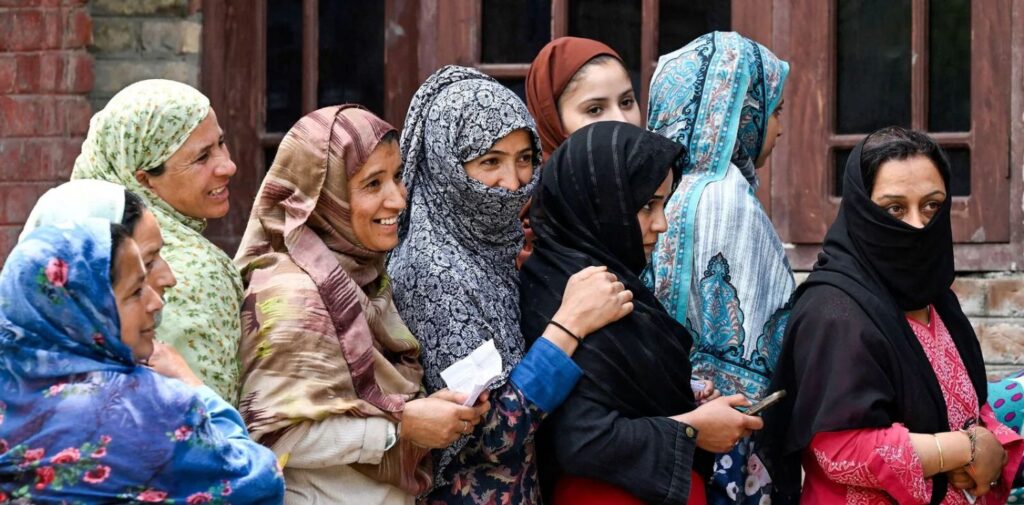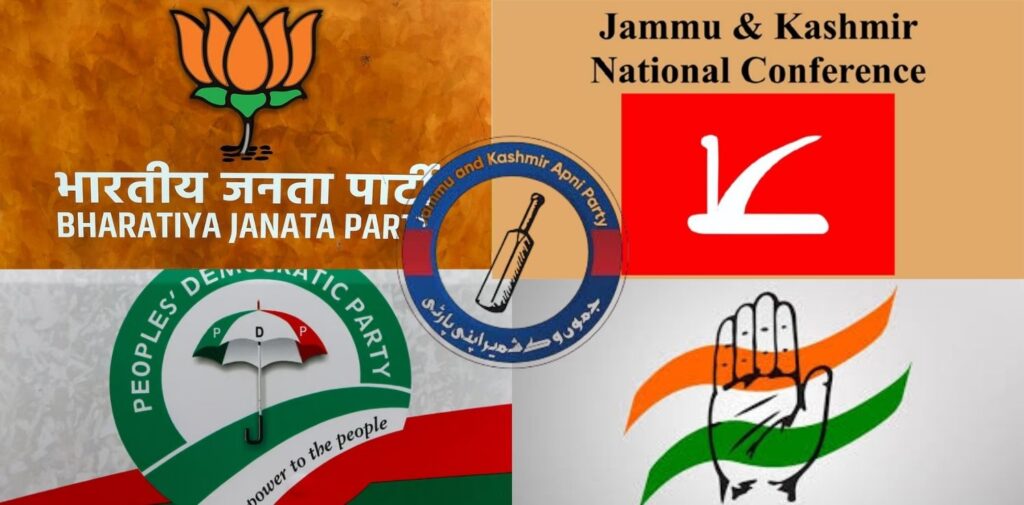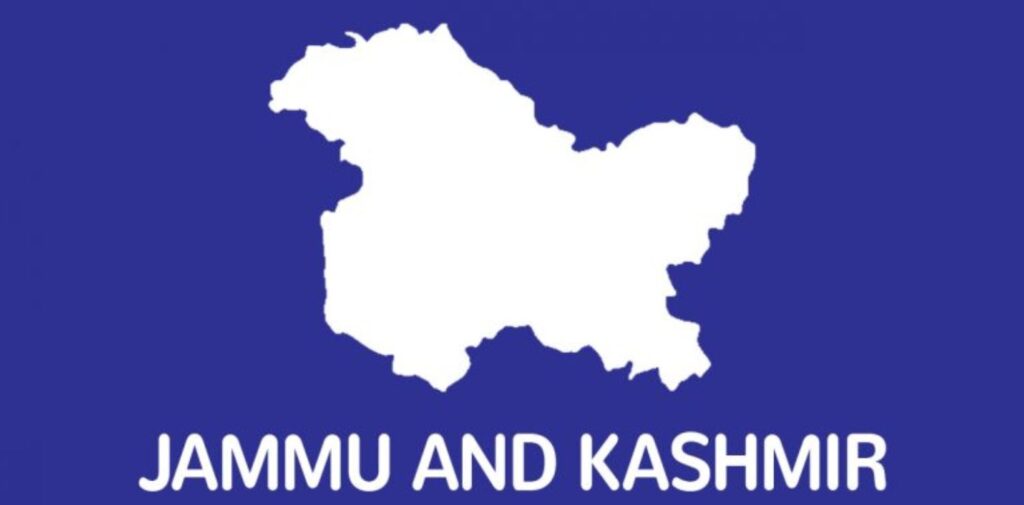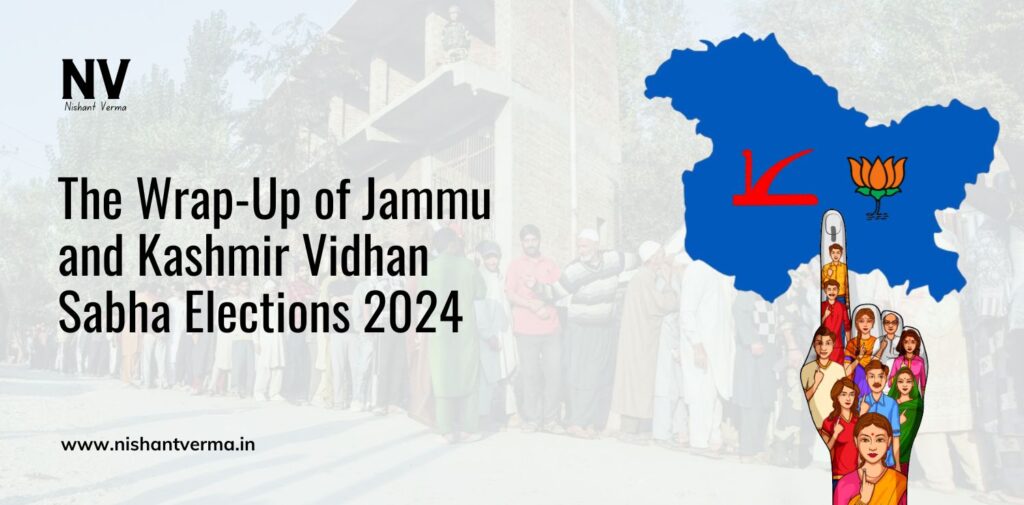The 2024 Jammu and Kashmir Vidhan Sabha elections were historic in many ways. Marking the first legislative assembly polls since the abrogation of Article 370 and the bifurcation of the state into two Union Territories in 2019, these elections have become a symbol of renewed democratic engagement and a barometer of political sentiment in the region. With a high voter turnout of around 69% in the final phase, the elections demonstrated a significant level of public participation and enthusiasm. This engagement was not just limited to the urban areas but also extended to rural and remote regions, reflecting the desire of the people to shape their political destiny and contribute to the region’s future.
High Voter Turnout and Peaceful Polling
Conducted in three phases, the Jammu and Kashmir Vidhan Sabha elections saw a steady increase in voter turnout with each phase, culminating in the highest participation during the final phase. This pattern indicated a growing confidence in the electoral process and a keen interest among the citizens to make their voices heard. The final phase’s turnout of 69% was particularly noteworthy, considering the region’s history of unrest, political turbulence, and security concerns. The participation of women and youth in large numbers was a positive sign, pointing towards a more inclusive democratic environment.

Despite the shadow of past violence and the lingering security concerns, the elections were conducted largely peacefully. This was made possible due to the extensive security arrangements put in place by the authorities and the concerted efforts of the Election Commission of India (ECI). The ECI, working closely with local administration and security forces, ensured that polling stations were well-guarded, logistical issues were addressed, and voters could exercise their franchise without fear or intimidation. The peaceful conduct of these elections was a testament to the region’s gradual return to political normalcy and a significant milestone in the restoration of democratic processes in Jammu and Kashmir.
Key Political Players and Campaign Strategies
Several key political parties, including the Bharatiya Janata Party (BJP), National Conference (NC), People’s Democratic Party (PDP), Indian National Congress, and the newly formed Jammu and Kashmir Apni Party, contested the elections, each aiming to secure a dominant position in the legislative assembly. The BJP, buoyed by its success in the 2019 Lok Sabha elections in the region, sought to consolidate its position further by highlighting its development agenda and the benefits of the abrogation of Article 370. The party’s campaign was centered on promises of infrastructural development, job creation, and economic growth.

In contrast, the NC and PDP focused their campaigns on issues of regional identity, autonomy, and the restoration of statehood. These parties, which have been traditional rivals in the region’s political landscape, positioned themselves as defenders of Kashmiri identity and self-governance. The NC, led by Farooq Abdullah, and the PDP, led by Mehbooba Mufti, called for greater political autonomy and criticized the central government’s handling of the region post-Article 370 abrogation. Their campaigns were built around promises of restoring political rights and pushing for a reversal of some of the legislative changes made after 2019.
The emergence of the Jammu and Kashmir Apni Party as a new political player added an interesting dimension to the elections. Led by Altaf Bukhari, the Apni Party positioned itself as a centrist force, advocating for a middle path between the BJP’s development agenda and the NC-PDP’s autonomy demands. The party’s campaign emphasized the need for stability, dialogue, and economic development, making it an attractive option for voters seeking an alternative to traditional parties.
Major Issues During the Jammu and Kashmir Vidhan Sabha elections
The primary issues dominating the election discourse were development, employment, restoration of statehood, and local governance. Development and economic growth were central themes, particularly for the BJP, which sought to showcase its infrastructure projects, investments in the region, and promises of increased employment opportunities. The BJP’s narrative was built around the idea that the abrogation of Article 370 has paved the way for greater development and integration of Jammu and Kashmir with the rest of India.

For the NC and PDP, the key issues revolved around political autonomy, restoration of statehood, and safeguarding regional identity. Both parties argued that the people of Jammu and Kashmir have lost their special status and political rights, and they pledged to fight for their restoration. The restoration of statehood emerged as a cross-party issue, with almost all political parties, including the BJP, agreeing on the need to restore statehood to Jammu and Kashmir at an appropriate time.
Employment was another major concern, particularly among the youth. The region’s high unemployment rate has been a long-standing issue, and all parties promised various schemes and initiatives to address this problem. Local governance and the strengthening of Panchayati Raj institutions were also highlighted as means to empower local communities and ensure better delivery of public services.
Key Takeaways and Implications
The successful conduct of the 2024 Vidhan Sabha elections has several significant implications for Jammu and Kashmir’s political and social future:
Restoration of Democracy: These elections were seen as a critical step towards restoring the democratic processes in Jammu and Kashmir after its reorganization into a Union Territory. The high voter turnout and peaceful conduct of the elections signal a return to political normalcy and indicate that the people of the region are keen to engage in democratic governance. This could pave the way for greater political stability and the revival of local governance structures.
Political Realignments: The entry of new political players like the Apni Party and the changing dynamics among traditional parties could lead to significant political realignments in the region. The emergence of coalition politics may become more pronounced, making alliances and negotiations key to forming a stable government. This shift could redefine the political landscape of Jammu and Kashmir, making it more competitive and diverse.

Impact on National Politics: The outcome of the elections is likely to have broader implications on national politics. A victory for the BJP would validate its policies post-Article 370 abrogation and strengthen its position in the region. Conversely, a strong performance by regional parties like the NC and PDP could signal the need for a more nuanced approach by the central government, taking into account local sentiments and demands for greater political autonomy.
Looking Forward: Challenges and Expectations
The new legislative assembly, once formed, will have the crucial task of addressing the region’s pressing issues. Unemployment remains a major challenge, and the new government will have to focus on creating job opportunities, particularly for the youth. Infrastructure development, improving public services, and ensuring good governance will also be high on the agenda.
Additionally, the restoration of statehood and the re-establishment of the Legislative Council will be key demands that the new assembly will have to navigate with the central government. The restoration of political rights and the strengthening of local governance institutions will be crucial for building trust between the people of Jammu and Kashmir and the central government.
Conclusion
The 2024 Vidhan Sabha elections in Jammu and Kashmir have not only reinvigorated the democratic spirit in the region but have also set the stage for potential political shifts. The high voter turnout and peaceful conduct of the elections are positive signs of the region’s gradual return to political stability.
As the results are awaited, all eyes are on which party or coalition will take charge and steer the region towards stability, growth, and a brighter future. Whether it is the BJP’s development agenda, the NC and PDP’s focus on autonomy, or the Apni Party’s call for stability and economic growth, the people of Jammu and Kashmir have spoken through their votes, and their verdict will shape the region’s trajectory for years to come.




